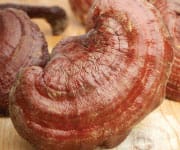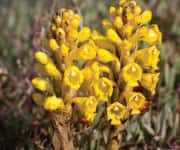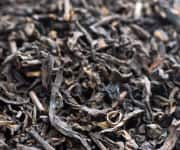Restore Youthful Immune Function

The diseases of aging such as cancer, pneumonia, and dementia are linked to a malfunctioning immune system.
This degenerative impairment is known as immune senescence. It accelerates aging by causing chronic inflammation while failing to protect against pathogens and malignancies.1-5
Not only do we lose the ability to defend against cancers and infections, but our failing immune cells create a state of hyper-inflammation that destroys neurons, the endothelium, and joints.6,7
In an effort to reverse this decline, Life Extension® is interacting with scientists seeking to restore youthful immune function. Each advance we uncover urgently needs to transition into routine clinical practice.
Researchers have identified three natural compounds that have been shown to reverse a broad spectrum of harmful changes that occur in the immune system with advancing age.
These three compounds are extracts of Reishi mushrooms, Cistanche and Pu-erh tea.
Each of these natural compounds produces unique immune system-modulating effects that deter the pathologic components of immune senescence.
Together, these nutrients can help improve immune functions lost to aging.
Rejuvenate the Immune System
If we are to live longer, healthier lives, we need our immune system to function at peak capacity.
Three compounds that have demonstrated an impressive ability to rescue the immune system from senescent decline are:
1) Cistanche
2) Reishi mushrooms
3) Pu-erh tea
Together, these natural extracts help combat immune senescence by several complementary mechanisms that include enhancing activity of natural killer cells and T cells.
What You Need to Know
Boosting the Aging Immune System
- Older age is associated with a decline in immune system function, known as immune senescence.
- Immune senescence increases the risk for infections and cancer.
- Certain plants and fungi have been found to bolster immune system cells and functions, improving immunity.
- Reishi mushrooms, Cistanche, and Pu-erh tea have all been shown to improve immune function by various complementary mechanisms.
- Intake of extracts of these plants and fungi may help restore immune function, reducing the risk for infection and cancer.
Reishi Mushroom Extract

The immune-boosting properties of Reishi mushrooms have been appreciated in Eastern medicine for thousands of years. Modern science is just now beginning to validate their health-promoting properties.8,9
Studies show that consuming these mushrooms improves immune function and has anti-tumor effects.9-16 In mice, Reishi has been found to promote the maturation and activation of immune system cells such as T cells, natural killer cells, dendritic cells, and macrophages.10-13 Lab studies show that Reishi also helps raise protective IL-10 levels and lower pro-inflammatory IL-6 levels.17,18
This indicates that Reishi augments the function of both the innate and adaptive immune system.
The innate immune system can be thought of as the body’s first line of defense, responding rapidly to potentially harmful insults such as viruses, bacteria, and cancer cells.
Natural killer cells are an important component of this innate immunity.19-24 The diminished numbers of active natural killer cells that can occur with aging predispose an individual to high rates of infection by viruses ranging from the common cold to herpes viruses.23-28
The adaptive immune system acts slower than the innate immune system but mounts a more specific, powerful attack against pathogens using specialized immune system cells called T cells.
With its ability to boost components of both innate and adaptive immunity, Reishi can protect the aging body from infections. This benefit has been borne out in laboratory studies demonstrating protection from many common viruses, including:
- Herpes simplex viruses—which cause oral and genital herpes viruses29
- Influenza viruses—which cause the flu30
- Epstein-Barr virus—which causes mononucleosis but can also contribute to the formation of cancer31,32
- Hepatitis B virus—a common cause of liver disease that can lead to liver failure33,34
- Human immunodeficiency virus (HIV)—the virus which causes AIDS35,36
In addition to offering protection from infection, Reishi exhibits anti-cancer properties as well—largely because of its ability to enhance immune function. In particular, the boost Reishi gives to natural killer cell, T cell, and macrophage function aids in the identification and destruction of abnormal cells that may develop into cancer.9,16
Reishi can also directly combat tumors by impairing the ability of tumor cells to grow, preventing tumor blood vessels from developing, starving the abnormal cells, and even directly killing cancer cells.9,16
In one study, Reishi mushrooms were applied to various human cancer cell lines.16 Not only did the Reishi reduce the growth of the cells, but it induced cell death in many of the diseased cells.
Perhaps most impressively, Reishi has been shown to significantly extend lifespan of mice.37 Researchers followed two groups of mice, one fed a normal control diet and the other fed a diet enriched with a Reishi extract. When most of the mice had passed away from old age, the Reishi supplemented group had lived as much as 148 days longer than the control group. Given that the lifespan of a mouse is typically less than two years, this represents a dramatic increase in longevity.
These studies provide support for why Reishi has earned the nickname, “mushroom of immortality.”
Cistanche Extract

Cistanche is a type of desert plant that, like Reishi mushrooms, has long been appreciated for its medicinal uses in Eastern medicine. Recently, several studies have confirmed the ability of Cistanche extract to boost immune cells in the body.38-41
In one study, researchers utilized a strain of senescence-accelerated mice, which age more rapidly than normal mice and display the same deterioration in immune function seen in human immune senescence. The mice fed a diet supplemented with Cistanche extract for only four weeks were found to have a significantly increased number of both T cells and natural killer cells in the blood, while lowering pro-inflammatory IL-6 levels in blood.
This enhancement in immune function translated to an extended lifespan as well. The average age after supplementation with Cistanche was 15% longer than controls.38
In addition to T cells and natural killer cells, Cistanche also helps activate other important immune cells, including macrophages, dendritic cells, and B cells.39,40
Encouraging results have been demonstrated in a human study as well. When elderly subjects took 100 mg of Cistanche extract daily for 12 weeks, there was a 6.1% increase in helper T cells and an almost 12% increase in natural killer cell activity. This increase represents a significant immune-boosting effect.41
Patients also experienced improved markers of vascular function and a decrease in fatigue. No significant adverse effects were observed.
Given that these same improvements in immune function resulted in enhanced longevity in animal studies, it can be assumed that the rejuvenating effect Cistanche has on the human immune system may assist in prolonging human lifespan as well.
Pu-erh Tea Extract

Both green tea and black tea have long been cherished for their numerous health benefits. One particular variety of fermented black tea, called Pu-erh, is especially beneficial for the aging immune system.42
Studies show that Pu-erh tea and its extract combat immune senescence by multiple mechanisms.42 Two of the chief ones include increasing natural killer and T cells.
In addition to its ability to bolster the immune system itself, Pu-erh tea appears to provide even more protection from infection with direct antibacterial and antiviral effects as well. Several studies have demonstrated that Pu-erh tea directly kills or inhibits the growth of bacteria and suppresses the growth of viruses such as hepatitis B virus.42
It also displays anti-tumor effects and it has been shown to lower cholesterol levels, fight obesity, and help control diabetes.
In one investigation, scientists studied the effects of Pu-erh tea on the senescence-accelerated strain of mice discussed previously.43
Before supplementation with Pu-erh tea, the mice demonstrated the same features of immune system deterioration seen in aging humans, including lower numbers of active T cells and natural killer cells. In addition, levels of the powerful pro-inflammatory cytokine IL-6 were markedly elevated in the senescence-accelerated mice, compared with controls. Remarkably, treating these mice with Pu-erh tea reversed their immune senescence.
The treated mice experienced enhanced numbers of T cells and natural killer cells and a significant 43% decrease in IL-6—benefits that more closely resemble a normal healthy immune system.
Based on these immune-boosting results, the researchers concluded that intake of Pu-erh tea may help older individuals prevent infection and cancer.
Powerful Anti-Inflammatory Effects in Humans
A human study of Pu-erh tea extract further emphasizes its role in reversing inflammatory cytokine levels. The study was performed among a group of patients with metabolic syndrome, a common condition defined by central obesity, borderline or high fasting glucose, and elevated triglycerides and cholesterol.44 Those with metabolic syndrome have higher levels of inflammation and are at an increased risk of having immune impairments.45
Subjects were given either Pu-erh tea extract twice daily or a placebo. They were instructed to exercise and observe a healthy diet during the study period, but were permitted no medicines that might otherwise affect the results.
After three months, patients provided blood samples for analysis of inflammatory cytokines and other markers of inflammation.
As expected, placebo recipients showed no significant changes in blood levels of TNF-a or IL-6 (pro-inflammatory cytokine), IL-10 (an anti-inflammatory cytokine), or C-reactive protein (CRP, a marker of total body inflammation).
Subjects supplemented with Pu-erh tea extract showed robust improvements in immune status, including:
- 21% reduction in IL-6,
- 23% reduction in TNF-a,
- 26% reduction in CRP, indicating significant decreases in their overall inflammatory status, and
- 34% increase of inflammation-quelling IL-10, further demonstrating the overall reduction in inflammation.
Clearly, Pu-erh tea extract offers multiple benefits to prevent the progress of immune senescence. But, just as a good roof provides multiple, overlapping structures to prevent leaks, good immune system coverage should offer multiple, overlapping mechanisms to ensure that no possible holes are left to allow untimely infections, inflammation, or cancers to progress.
The Immune System
A Breakdown in the First Line of Defense
Natural killer cells are the body’s first responders against viral infections and cancer cells, and play an important role in battling bacterial and fungal infections.19-24 The age-related decline in the function of natural killer cells leads to higher rates of many viral, bacterial, and fungal infections—and these infections are more likely to be serious in age-related immune senescence.26-28
For example, research shows that the common cold (which is caused by a virus) is more frequent in individuals with low numbers of natural killer cells—and conversely, that greater natural killer cell function helps protect against viral outbreaks.23-25
The decline in natural killer cells has also been shown to increase the rates of viral infections, including viruses that cause influenza and viruses in the herpes family.26 These include cytomegalovirus (CMV), Epstein-Barr virus, varicella zoster (which causes chicken pox and shingles), and herpes simplex viruses (causing oral and genital herpes).
Compounding the problem, cytomegalovirus (CMV) itself may directly contribute to the loss of immune function.46,47 In one study, higher levels of CMV in older women correlated with an increased five-year risk of all-cause mortality.48
A Breakdown in the Body’s Targeted Killers
T cells are targeted killers that are part of the body’s adaptive immunity. If any infections go undetected by the natural killer cells, T cells are the “big guns” that step in and eliminate the infected cells.
These cells hunt down one specific target and stage a powerful attack to eliminate it once the enemy has been identified.
T cells contribute to long-term immunity, the phenomenon in which the body “remembers” an antigen (a virus, bacteria, or even a vaccine). That way if an individual is later exposed to the same virus, bacteria, or antigen, the immune system is primed to destroy it more quickly in the future—often before any signs of the disease occur.
Summary

Immune senescence puts the elderly at increased risk for frequent and severe infections, cancer, and a variety of chronic inflammatory diseases.
Compounds found in various plants and fungi bolster the weakened immune system, improving immunity and reducing the risk for infections and cancer.
Reishi mushrooms, Cistanche, and Pu-erh tea boost the immune system by several complementary mechanisms, including amplifying the activity of natural killer cells, T cells, and various other immune system components.
Adding these immune-boosters to the diet may help thwart waning immunity in older age, helping give our body a fighting chance against many infectious diseases and cancer.


Social Login